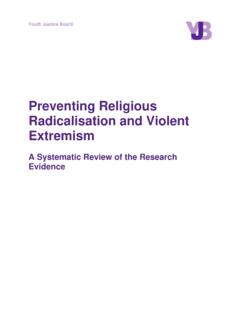Transcription of Tackling extremism in the UK
1 Tackling extremism in the UK December 2013 Report from the Prime Minister s Task Force on Tackling Radicalisation and extremism Cabinet Office 70 Whitehall London SW1A 2AS Publication date: December 2013 Crown copyright 2013 This publication is available for download at You may re-use this information (not including logos) free of charge in any format or medium, under the terms of the Open Government Licence. To view this licence, visit uk/doc/open-government-licence/ or write to the Information Policy Team, The National Archives, Kew, London TW9 4DU, or e-mail: 1 The UK deplores and will fight terrorism of every kind, whether based on Islamist, extreme right-wing or any other extremist ideology.
2 We will not tolerate extremist activity of any sort, which creates an environment for radicalising individuals and could lead them on a pathway towards terrorism. The killing of Drummer Lee Rigby in Woolwich was the impetus to look closely at whether the government was doing all it could to confront extremism and radicalisation. We know that the international terrorist threat to the UK comes primarily from those people who are inspired by Al Qa ida s distorted interpretation of Islam and use that as justification for killing innocent people. But we must tackle extremism of all kinds, including the Islamophobia and neo-Nazism espoused by the murderer of Mohammed Saleem to justify his terrorist attacks against mosques in the West Midlands.
3 The Prime Minister set up the extremism Task Force to identify any areas where our current approach was lacking and to agree practical steps to fight against all forms of extremism . We have made progress since this government came to power. We have removed over 18,000 items of online terrorist propaganda and intervened more often than ever before to limit the opportunities for hate preachers to spread their messages. But we recognise that we can and should do more. This response is broader than dealing only with those who espouse violence we must confront the poisonous extremist ideology that can lead people to violence; which divides communities and which extremists use to recruit individuals to their cause; which runs counter to fundamental British values such as freedom of speech, democracy and equal rights; which says that the West is at war with Islam and that it is not possible to be a true Muslim and to live an integrated life in the UK.
4 Since the 2011 revised Prevent strategy, the government has defined extremism as: vocal or active opposition to fundamental British values, including democracy, the rule of law, individual liberty and mutual respect and tolerance of different faiths and beliefs. We also include in our definition of extremism calls for the death of members of our armed forces, whether in this country or overseas . There is a range of extremist individuals and organisations, including Islamists, the far right and others. As the greatest risk to our security comes from Al Qa ida and like-minded groups, and terrorist ideologies draw on and make use of extremist ideas, we believe it is also necessary to define the ideology of Islamist extremism .
5 This is a distinct ideology which should not be confused with traditional religious practice. It is an ideology which is based on a distorted interpretation of Islam, which betrays 2 Islam s peaceful principles, and draws on the teachings of the likes of Sayyid Qutb. Islamist extremists deem Western intervention in Muslim-majority countries as a war on Islam , creating a narrative of them and us . They seek to impose a global Islamic state governed by their interpretation of Shari ah as state law, rejecting liberal values such as democracy, the rule of law and equality. Their ideology also includes the uncompromising belief that people cannot be Muslim and British, and insists that those who do not agree with them are not true Muslims Challenging and Tackling extremism is a shared effort.
6 We welcome the spontaneous and unequivocal condemnation from Muslim community organisations and other faith groups in response to the Woolwich attack. The government, as much as organisations and communities in the UK, must take responsibility. We have been too reticent about challenging extreme Islamist ideologies in the past, in part because of a misplaced concern that attacking Islamist extremism equates to an attack on Islam itself. This reticence, and the failure to confront extremists, has led to an environment conducive to radicalisation in some mosques and Islamic centres, universities and prisons.
7 Many institutions do not have the capacity to play their full part in challenging extremists, even when they want to. The government has a role in leading this challenge, ensuring that communities where extremists operate, and the organisations working against extremists, have the capability to confront it themselves. The extremism Task Force looked in detail at the following areas and agreed these practical steps to address the gaps in our response. Disrupting extremists It is often too easy for extremist preachers and groups to spread extremist views which can lead people into terrorism, while at the same time being careful not to contravene existing laws on incitement to violence or glorifying terrorism.
8 Some organisations and religious institutions may be targeted and infiltrated by extremist groups or individuals. When they are, it can be hard for those institutions to take direct action to remove extremists from their midst. Some extremist groups target charities and seek to exploit and benefit from charitable status. While protecting society from extremism , we will also continue to protect the right to freedom of expression. These proposals are not intended or designed to restrict or prevent legitimate and lawful comment and debate. 3 We will close these gaps in our legislation by: making sure organisations have the support and advice they need to confront and exclude extremists.
9 They will get expert advice from specialist charities if they have to resort to legal action to exclude extremists considering if there is a case for new types of order to ban groups which seek to undermine democracy or use hate speech, when necessary to protect the public or prevent crime and disorder considering if there is a case for new civil powers, akin to the new anti-social behaviour powers, to target the behaviours extremists use to radicalise others consulting on new legislation to strengthen the powers of the Charity Commission: these powers will help us tackle extremism , as well as other abuses of charitable status such as tax avoidance and fraud In addition, the police will.
10 Ensure that the extremist dimension of hate-crimes is properly logged and taken into account when conducting their investigations share information with other countries to identify individuals with extreme right-wing views coming to the UK, as they do with Islamist extremists Countering extremist narratives and ideology Extremist propaganda is too widely available, particularly online, and has a direct impact on radicalising individuals. The poisonous messages of extremists must not be allowed to drown out the voices of the moderate majority. The Task Force has agreed to: build the capabilities of communities and civil society organisations so that they can campaign against the large volume of extremist material.
















